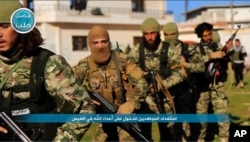A drone attack in northern Syria, part of a series of recent strikes by the United States in and around the province of Idlib, killed a top al-Qaida leader who had participated in the planning for the 9/11 attacks on New York and Washington.
Several hours after the drone strike Sunday, jihadists confirmed on several websites the death of Abu al-Khayr al-Masri, who was appointed a deputy leader of the terror group last year.
A close confidante of al-Qaida's emir Ayman al-Zawahiri, a fellow Egyptian, as well as the husband of one of Osama bin Laden's daughters, the 59-year-old al-Masri was killed by a missile that struck a small car in which he was traveling. U.S. officials have confirmed the strike, but won't say who was being targeted.
Video posted online by jihadists showed a four-door Kia sedan destroyed by the roadside. There was a large hole in its roof.
The news of his death was first reported by analyst Charles Lister, author of the book The Syrian Jihad. He described the death as "big news," pointing out that the dead jihadist was a member of the terror group's secretive Shura Council since its formation in the late 1980s.
"Abu al-Khayr al-Masri was jihadi royalty of the highest pedigree," Lister said. "Abu al-Khayr personally hosted the meeting in which al-Qaida planned the 9/11 attacks.
"His arrival in Syria in mid-2015 heralded al-Qaida central leadership's pivot to Syria as its key global safe haven," Lister said.
Loyal fighter
Abu al-Khayr fought alongside bin Laden in Afghanistan and spent more than 10 years in detention in Iran, fleeing there after the U.S. invasion of Afghanistan. According to the Long War Journal, an online publication of the Washington-based Foundation for the Defense of Democracies, he was released in 2015 for an Iranian diplomat who had been kidnapped in Yemen.
After a brief sojourn in Iraq, he was sent to Syria to join up with an advance guard of al-Qaida veterans sent to the war-torn country by al-Zawahiri to assist in the grooming of a local jihadist group, Jabhat al-Nusra, and to form an independent organization, which some Western officials dubbed Khorasan.
In July 2016, Abu al-Khayr al-Masri released an audio message in support of the Syrian jihadist group Jabhat al-Nusra, breaking with al-Qaida, a break approved publicly by al-Zawahiri.
The break was seen by U.S. and British intelligence officials as a ploy, part of a makeover for the Syrian jihadist group that would make it more appealing to Syrian rebels battling to oust Syrian President Bashar al-Assad.
U.S. Central Command Chief Gen. Joseph Votel portrayed the break as a public relations gambit. "At the core of it, they are still al-Qaida," he told a security forum in Aspen, Colorado, last year.
The U.S. government designated al-Masri an al-Qaida associate in October 2005. The Treasury Department said he was born Abdullah Muhammad Rajab abd al-Rahman in 1957 in the Egyptian town of Kafr al-Shaykh. Analysts say he fought in Egypt, Bosnia and Pakistan.
Another target
Earlier this month, the Pentagon announced a U.S. drone strike killed another core al-Qaida leader with ties to Ayman al-Zawahiri, Abu Hani al-Masri. He was the fourth al-Qaida veteran the U.S. claimed it had targeted this year. He was killed while riding in a vehicle near Idlib, a defense official told VOA.
U.S.-led coalition airstrikes have killed more than 100 jihadist fighters in northern Syria in recent weeks. Some have been members of the former Jabhat al-Nusra, which merged last month with four other militias and has been renamed Tahrir al-Sham; while others have been part of the Khorasan group. Jihadists in January accused more moderate Islamist and secular based groups of supplying targeting information to the U.S.
Tahrir al-Sham is locally focused, Lister said. But the Khorasan group has been preparing the ground for attacks on the West.
"Ultimately, this is what al-Zawahiri always dreamed about for Syria — the creation of safe bases' from which the far enemy could be threatened thanks to preparatory work undertaken by a locally focused affiliate," Lister said.






